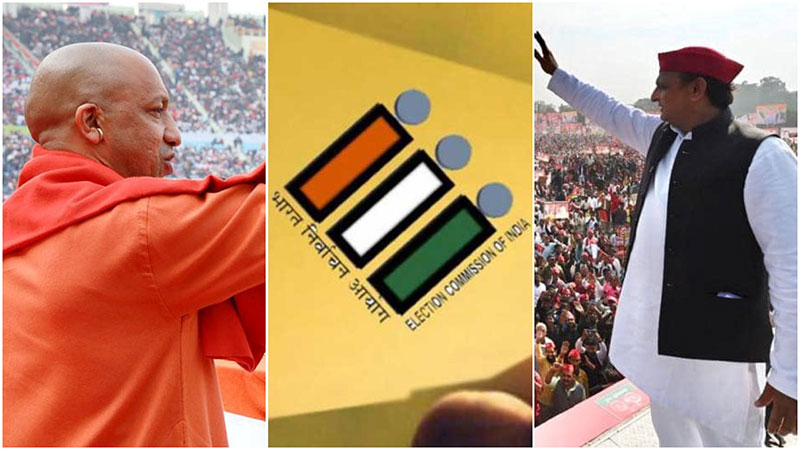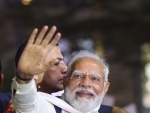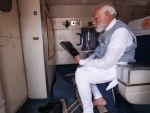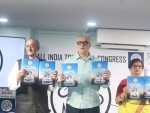 Assmrbly Polls
Assmrbly Polls Assembly Polls: Voting kicks off in UP, Uttarakhand, Goa
Lucknow/Panaji: Voting began at 55 Assembly constituencies of Uttar Pradesh, spread across nine districts, for the second phase amid tight security.
Voting also commenced in Uttarakhand and Goa.
Around 2.02 crore voters, including 1.08 crore males and 94 lakh females are eligible to decide the electoral fate of 586 candidates, including 69 women, in this phase of Uttar Pradesh polling, according to Chief Electoral Officer Ajay Kumar Shukla.
He said that polling, which will continue till 6 pm, will be held at 23,404 polling booths at 12,544 polling stations in Saharanpur, Amroha, Bijnor, Rampur, Sambhal, Moradabad, Bareilly, Badaun and Shahjahanpur.
"In the 2017 elections, 65.53 per cent votes were polled in this phase," added the CEO.
Additional Director General of Police (Law and Order) Prashant Kumar said that eight Assembly constituencies, including Nagina, Dhampur, Bijnor, Asmauli, Sambhal, Deoband, Rampur Maniharan and Gangoh, have been categorised as sensitive.
"In the second phase, total 436 hamlets and localities have been marked as vulnerable and 4,917 polling booths have been identified as critical," he added.
The ADG said that 127 pink booths have been set up specially for women, on which 42 female inspectors or sub-inspectors, 488 constables and head constables have been deployed. "In this phase, 733.44 companies of Central forces will be deployed at 12,544 polling booths," he said.
Polling will be held across Uttarakhand, Goa and in parts of Uttar Pradesh. I call upon all those whose are eligible to vote today to do so in record numbers and strengthen the festival of democracy.
— Narendra Modi (@narendramodi) February 14, 2022
"From UP Police, 6,860 inspectors and sub-inspectors, 54,670 constables and head constables, along with 18.1 companies of Provincial Armed Constabulary (PAC), 930 PRD jawans and 7,746 Chowkidars, have been deployed in this phase," Kumar said.
Riding high on Modi wave, BJP made inroads in this region in 2017 by winning 38 seats, whereas SP won 15 and its ally Congress two.
According to political analysts, the division of Dalit votes was such that BSP failed to open its account. Three ministers in the Yogi government are trying their electoral luck in this phase. Suresh Khanna is contesting from Shahjahanpur, Gulabo Devi from Chandausi in Sambhal district and Baldev Singh Aulakh from Bilaspur seat in Rampur district.
Prominent opposition leaders who are contesting in this phase include senior Samajwadi Party (SP) leader Azam Khan from Rampur Sadar, former minister in Yogi government and now SP candidate Dharmpal Singh Saini from Nakur in Saharanpur and Mehboob Ali from Amroha.
As most of the seats in this phase are dominated by Muslims and Dalits, it is considered to be a bastion of Samajwadi Party (SP) and Bahujan Samaj Party (BSP).
Keeping in view the caste equations in this region, political parties have fielded candidates strategically. In view of the demography, political parties have fielded 75 Muslim candidates. While BSP has fielded maximum 25 Muslim candidates, SP-Rashtriya Lok Dal (RLD) combine has filed 18 candidates and Congress has named 23 Muslim candidates in this phase.
Asaduddin Owaisi led All India Majlis-e-Ittehadul Muslimeen (AIMIM), which is trying hard to gain ground in politically important UP, has made the contest interesting by fielding 18 Muslim candidates.
This is also important as out of 55 seats Muslims decide victory or defeat on 25 seats and Dalits on 20 seats.
According to political analysts, while resentment among the farmers, especially after year long protest against the three farm laws, could increase problems for ruling BJP, SP is trying to better its performance riding on its alliance with RLD and other smaller parties having presence in this region.
It may be mentioned here that in 2012 when SP came to power in the state it won 27 seats out of 55, whereas only eight seats went to BJP's share.
Of the nine districts in the second phase, Dalit and Muslim voters are the deciding factor in Rampur, Sambhal, Moradabad, Saharanpur, Amroha and Bijnor. SP, BSP and RLD contested 2019 Lok Sabha polls in alliance and won all the seats in this region.
While SP won Rampur, Moradabad and Sambhal, Saharanpur, Nagina, Bijnor and Amroha went to BSP.
According to the political analysts this time as the elections are focused on balancing caste equations, it will be difficult for the BJP to attract votes on the basis of security and religious grounds.
Besides, from the list of candidates of all the parties in the fray it is clear that they are dependent on the polarization of Dalit, Jat and Muslim electorates, they said. Problems of the farmers remains a major issue in western UP, which was the center of the agitation against three farm laws.
By withdrawing the three farm laws, the Modi government has attempted to mitigate the effect of the protest, but resentment among the farmers remains a challenge for BJP.
To water down the resentment Prime Minister Narendra Modi, Home Minister Amit Shah, Chief Minister Yogi Adityanath and BJP president JP Nadda have extensively campaigned in the region highlighting the development and welfare works done by the 'double engine' government, specially those related to the farmers.
Besides, BJP has made Amit Shah, considered to be the party's 'Chanakya', in-charge of the poll strategy in the western UP, but it will also prove to be a litmus test for him.
It would be interesting to see whether SP will be able to succeed this time after failed alliance efforts several times in the past. BSP is also making an effort to turn the contest between BJP and SP-RLD into a triangular fight.
The party is also vying to win two dozen Dalit-dominated seats in the region.
For the party, which failed to secure even a single seat in the last elections, it's a do or die situation.
Voting begins in Goa:
Polling began in Goa to elect representatives at all the 40 seats of the Assembly.
Today is the day of celebration of democracy. I appeal to everyone to come out and cast your vote. A vote for the future, a vote for stability, a vote for fulfillment of aspirations, a vote for all round development, a vote for prosperous Goa.
— Dr. Pramod Sawant (@DrPramodPSawant) February 14, 2022
The polling, which started at 7 am, will continue till 6 pm. According to the Election Commission officials, polling is being held at 1,722 polling stations in South Goa and North Goa districts.
This time 80 more polling stations have been added for the single-day balloting, compared to the 2017 Assembly elections.
A total of 11.6 lakh electorates are eligible to decide the electoral fate of 301 candidates, including 14 women.
The electorate include 9,590 persons with disabilities (PwDs), 2,997 over 80 years, 41 sex workers and nine transgenders.
The average number of eligible voters per booth in the state is 672.
Uttarakhand begins to vote:
Uttrakhand began voting to elect representatives of all the 70 Assembly constituencies in the mountainous state.
Polling began at 8 am and will continue till 6 pm.
For the first time due to Covid-19 outbreak, voters above the age of 80 and those with disability have been given the option of postal ballots.
A total of 81,72,173 voters are eligible to decide the electoral fate of 632 candidates in these elections.
There are also 35 migrant voters, as per poll panel.
Special arrangements have been made for the differently-abled, pregnant women and senior citizens.
BJP, Congress and the Aam Aadmi Party have fielded candidates in all the 70 seats of the state.
Ever since Uttarakhand was carved out of Uttar Pradesh, the hilly state has given mandates alternatively to the Congress and the BJP.
(With UNI inputs)
Support Our Journalism
We cannot do without you.. your contribution supports unbiased journalism
IBNS is not driven by any ism- not wokeism, not racism, not skewed secularism, not hyper right-wing or left liberal ideals, nor by any hardline religious beliefs or hyper nationalism. We want to serve you good old objective news, as they are. We do not judge or preach. We let people decide for themselves. We only try to present factual and well-sourced news.







